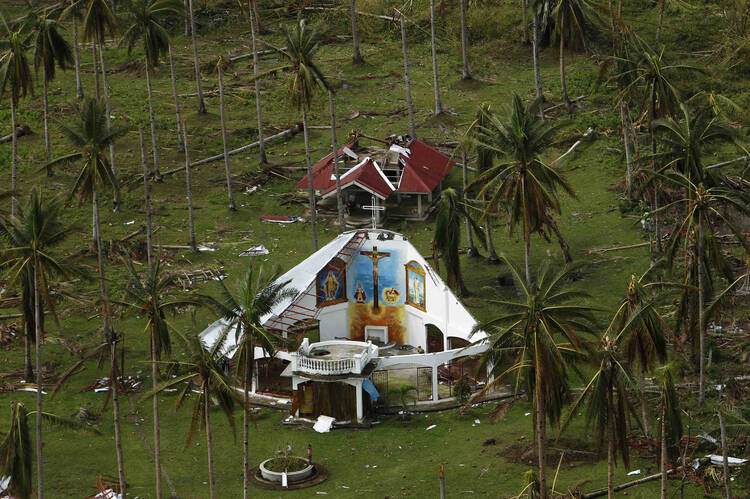Global Warning
Poverty helped propel the death and suffering in the Philippines just as surely as the surging waters of San Pedro Bay. Around the world in places like Tacloban City, people who live in poverty are often crowded into the most inhospitable and ill-conceived locations, whether backed up against the ocean in the Philippines or against an eroded hillside in Guatemala. The shoddy construction of the homes of the poor offer little to no protection against life-threatening weather events. Having a second floor or a house constructed out of something sturdier than wood and tin meant the difference between life and death for many during Typhoon Haiyan. The suffering in Tacloban has been compounded by the region’s poor infrastructure. A choked road system has prevented people from escaping the disaster zone and relief supplies from getting to them.
In the aftermath of Hurricane Sandy in 2012, municipal leaders on the U.S. East Coast began plans for billion dollar mitigation projects to stand against future storms and the historic challenge of rising global sea levels. They have the wherewithal and the luxury to do this. Sprawling urban communities throughout the 7,000 islands of the Philippines sit at or near sea level in the middle of the world’s most storm-prone region. How realistic will it be for Tacloban City officials to contemplate similar defenses against the ravages of the next super-typhoon?
While the West is the largest contributor to global warming, it will be the poor nations of the world that endure its worst effects. There has been much talk but little action toward more justly sharing that burden. The nations of the West and other primary contributors to global warming could begin by helping to pay for shelter that meets minimum standards of survivability, road systems adequate to emergency evacuation and the resettlement of those who live in sites that can no longer be protected against the world’s surging storms.
Desert Experience
While the world has been preoccupied with the sprouting of illegal Jewish settlements on occupied Palestinian territory on the West Bank, within Israel proper the long cherished dream of making the Negev desert bloom is running up against some facts on the ground that are difficult to dislodge—the Bedouin, who have lived on the Negev since at least the seventh century. Many now live in poor, “unrecognized” townships that predate the establishment of the State of Israel or were built under Israeli pressure during the 1950s. These Arab Israeli citizens have long struggled under the burden of unofficial status, denied a clear title to their homes or land and denied access to basic state infrastructure.
Now, however, even these poor communities have become the targets of settler expansion. Renewed efforts to construct gated Jewish farming communities on Bedouin sites, the so-called Prawer Plan, threaten to dislocate 40,000 Arab Israeli citizens on behalf of Jewish Israeli citizens. The plan, in effect since 2011 and now entering a terminal phase, has already led to the destruction of hundreds of Bedouin homes and now seeks the demolition of about 40 complete villages and the confiscation of 70,000 hectares of land in the Negev. The region’s informal land claims and dizzying array of sometimes contradictory deeds from the Ottoman era or issued under the British mandate make it easy for Israeli authorities to ignore Arab ownership claims.
Activists with the Jewish Voice for Peace and the Association for Civil Rights in Israel describe the plan as a human rights and diplomatic disaster, but the Obama administration has been completely silent on the matter. More prominent U.S. voices of condemnation would be welcome, particularly from within the State Department, before the Middle East peace process sinks completely into geopolitical farce.
An Invitation to Speak Up
The decision to consult the faithful as part of the preparation for next year’s meeting of the Synod of Bishops by means of a questionnaire on “the pastoral challenges to the family” represents a challenge and an opportunity for a church ready to listen. As Cardinal John Henry Newman wrote in his classic essay “On Consulting the Faithful in Matters of Doctrine” (1859), seeking the sensus fidelium is essential because the “body of the faithful is one of the witnesses to the fact of the tradition of revealed doctrine.”
The preparatory document for the synod lists several challenges facing various cultures: cohabitation that does not lead to marriage, same-sex unions, dowries that resemble a purchase price for the woman, the caste system, “hostile” forms of feminism, surrogate motherhood and the abandonment of the sacrament of penance.
The directive urges the bishops to share the questionnaire “as widely as possible. The bishops of England and Wales have posted the questionnaire online and invited responses. Bishop John Hine of Britain told Vatican Radio the document is “extremely significant” and added: “It really responds to the desire of the people...to be consulted on matters which concern them so deeply.” This effort, which is to be commended, is in tune with the desire of Pope Francis to have “shepherds with the smell of the sheep.”








